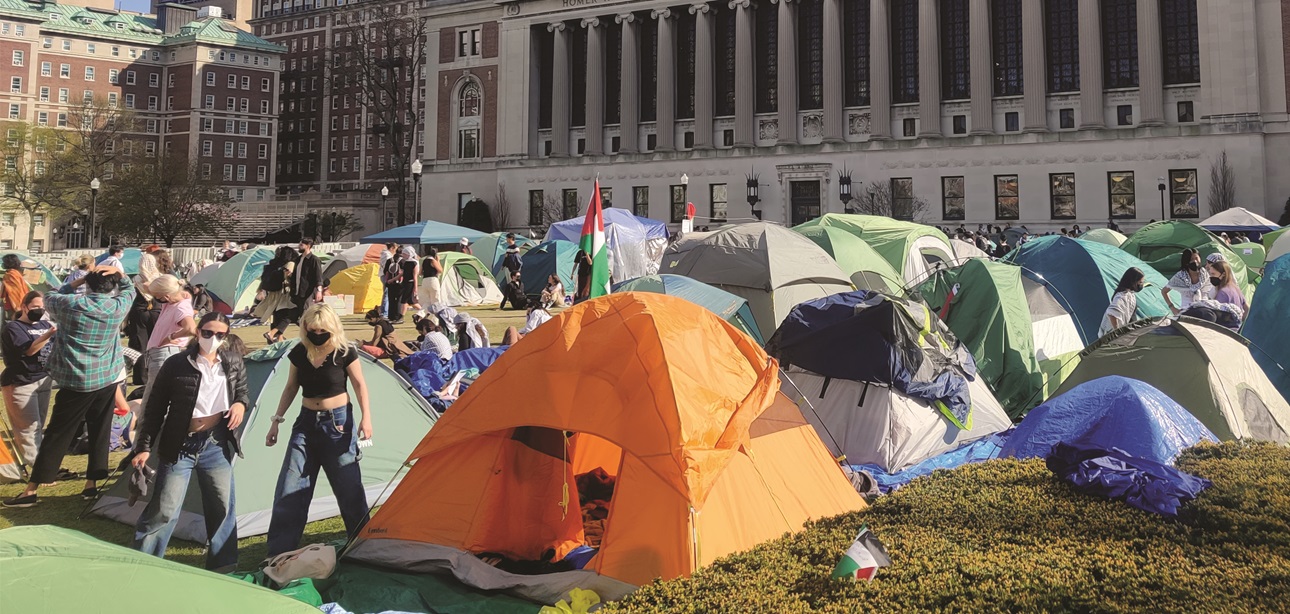
NEW YORK—U.S. House Speaker Mike Johnson steps out the front door of Columbia University’s library and immediately faces a wave of heckling. The discomfort on his face settles into a sickly sweet politician’s smirk.
“Booooo!” the crowd heckles. “We can’t hear you!”
“Enjoy your free speech,” Johnson says into the mic, though the sound is fed directly into the dozens of television news networks present, and so no one in the crowd can hear him.
Of course, Johnson isn’t here to address the Columbia student body. They simply present a tidy backdrop for his true audience: the extreme right, who claim that Biden has let the situation at campuses across the country spiral out of control.
The GOP-aligned media say the university protests in support of an immediate ceasefire in Gaza and divestment from the Israeli war machine are worse than the white supremacist march in Charlottesville. They claim that these ceasefire protests are hateful anti-Semitic mobs, even going so far as to call them “nascent pogroms.” Indeed, they claim the uprisings are so horrific that mass arrests are not enough—Biden must send in the National Guard!

But Johnson’s show at Columbia is strictly for the cameras. Directly across the campus on a portion of the South Lawn, dozens of tents filled with hundreds of students tell a different story. There, people are socializing among themselves, some sitting quietly in the sunshine and creating art. Young people are laughing with each other, eating donated food, and lounging around. They’re hardly the bussed-in Antifa super-soldiers corporate media would have you believe are actually running the show.
Small Palestinian flags dot the hedges surrounding the encampment, some with the names of martyred Palestinians scrawled in black marker. The entrance to the encampment itself is staffed by friendly volunteers who screen students as they come and go. A whiteboard sits at the entrance explaining the purpose and expectations of behavior within the encampment to keep the peace, flanked by smaller signs printed with red poppies that outline their demands:
We Will Remain Until Columbia Concedes to Our Demands
- Divest all finances, including the endowment, from corporations that profit from Israeli apartheid, genocide, and occupation in Palestine.
- Complete transparency for all of Columbia’s financial investments.
- Amnesty for all students and faculty disciplined or fired in the movement for Palestinian liberation.
There are not just students here; plenty of workers have converged here as well. Thousands of Columbia faculty and staff walked out this past Monday in protest of Columbia president ,Minouche Shafik’s decision to send in the notorious NYPD’s Strategic Response Group to brutally arrest hundreds of their students for peaceful protest.

One of the points on the whiteboard instructs participants to not engage with counter-protesters. With whole sections of mainstream media howling for violence against ceasefire demonstrators, the encampment cannot afford to do otherwise. Despite accusations of anti-Semitism and violence against the student body, a small counter-protest adjacent to the encampment, with posters of Israeli hostages in Gaza and an Israeli flag, remains untouched.
The vibes are peaceful yet bustling. A staff organizer from the United Auto Workers is here to check in on her graduate student membership. A dozen faculty members wear yellow safety vests as they line up outside of the encampment for de-escalation training. A single student coordinates media presence, and sends over a smiling young man to speak with People’s World.
“Hang here a second, let me grab some food. I hear there’s matzo brei!” He disappears into the encampment and then generously returns with a second plate of matzo and eggs and a bottle of water for our correspondent. “We have so much food here, people just come and drop stuff off all the time.”
His name is Jared, a graduate student studying conservation biology. “I grew up Zionist, being taught that Israel was an important part of my Jewish identity. Part of practicing Judaism and being a good Jew was supporting Israel. I was also taught that Judaism was about peace, about justice, and about standing up for all oppressed people.
Got active after learning more
“The more I learned about what Israel actually does on a global stage, the more I felt uncomfortable with the disparity between the teachings of peace and the support for Israel.”
“I felt like my voice was important as a Jewish person to try and dispel some of the myths [regarding] anti-Semitism and the anti-Semitism of the movement. Of course, that hasn’t worked. Speaker Johnson is here today to condemn anti-Semitism while he also espouses the great replacement theory.”
Students at Columbia were pushed into these circumstances as a result of the administration’s decision to ban Students for Justice in Palestine (SJP) and Jewish Voice for Peace (JVP) in the aftermath of Oct. 7th and the subsequent protests against the unfolding massacre in Gaza.
While his previous Palestinian activism was confined to difficult conversations with family, Jared decided to link up with more direct action once he heard about Columbia’s attempts to quell the movement.
“I found out Jewish Voice for Peace existed after they were suspended by Columbia, so they owe a big thank you to President Shafik because a lot of other people who felt similarly [to me] also joined up afterwards.”
Jared believes the accusations of anti-Semitism are used to distract from the real issue: Palestine. “As the genocide continues and as the national news media and politicians and Israel try to keep the focus on Columbia and the Jewish students of Columbia, I’m here to tell everyone: We’re fine. We’re free to protest with people, we’re free to protest against the movement, we’re free to do neither, but regardless, we’re safe and we want to make sure that the emphasis and spotlight remains on Palestine.”
Jared says that attention has to be kept on the genocide that Israel is committing in Gaza “with U.S. taxpayer dollars,” a genocide “that Columbia is invested in.” Such a large portion of the student body and the faculty are united against it, but the administration is unwilling to compromise. “They would rather send police to arrest their own students than listen to them.”
Jared says that while he came to pro-Palestinian advocacy later in life, beforehand he was shaped by participating in Black Lives Matter protests and protests for the environment and better transit. While Jewish students like him might be at odds with their families and universities, they aren’t backing down.

“We’ve had enough people call us ‘fake Jews,’ ‘kapos,’ ‘judenrats,’ and it just sort of goes in one ear and out the other. I know that I’m on the right side of this. They try to dismiss us all, but there’s too many of us. We’re not all tokens. The Jewish students of Columbia stand with Palestine, and they stand with SJP.”
Next to the encampment are thousands of stacked chairs, pre-positioned for Columbia’s commencement ceremonies, which are due to begin on May 10. With in-person classes canceled through the end of the school year on account of the encampment, somehow so threatening in its peaceful and well-organized presence, what will happen as commencement draws closer?
Kicking people out was a failure
“Clearly kicking people out didn’t work,” says Jared. “They kicked a hundred people out on East Lawn and a thousand more stepped up to take their place. If they try and kick out a thousand people, it will further galvanize the community because we are steadfast in our beliefs and steadfast in our convictions.
“The one way to get this to end—and I think Shafik knows this—is to listen to our demands and fully divest from Israel and make history as the first campus to divest our financial holdings from institutions of oppression, the same way we made history as the first campus to divest from South African apartheid. All this can be over tomorrow.”
When asked if he is worried that New York Gov. Kathy Hochul will send in the National Guard to crack down on the Columbia encampment, Jared’s expression becomes intense, focused. He answers with one clipped word: “No.”
“They want us to be worried. They want to chip away at the support. They want people to be scared. They know that a small group of people is easier to deal with than a big group. They issue empty threats to try to scare people away, so if they do send in police or National Guard, there’s fewer to arrest and it won’t be as much of a media scene. I’m not going to be intimidated by threats from my university.”
Since the mass arrests at Columbia, other encampments sprang up in California, Texas, Tennessee, Minnesota, Michigan, upstate New York, Massachusetts, New Jersey, Connecticut, Pennsylvania, and North Carolina. In New York City alone, students at CCNY, NYU, and The New School followed suit.
Despite crackdowns and police terror, the ceasefire demonstrators are undeterred. What do the students at Columbia think, knowing that their campus has inspired other students across the country to take up their demands and tactics?

“It’s inspiring, and we hope it continues, but we hope that they do it with the right message. We don’t want these to be encampments in solidarity with Columbia, we want them to be in solidarity with Palestine. It’s a crazy media frenzy here, and we welcome people that are here to help spread our message, but the message should be focused on Palestine.”
While it is increasingly difficult to access the Columbia campus, Jared encourages local supporters of the encampment to participate by joining in protests like the sit-down seder organized by IfNotNow in Brooklyn earlier in the week.
As our interview draws to a close, a few far-right social media influencers who were covering the Mike Johnson press conference earlier finally arrive to crash the encampment, trying to push their way past the student volunteers while yelling loudly and demanding to be let inside.
In response, the faculty who have just finished their de-escalation training turn their backs on the outside agitators, linking arms to protect their students. Their bright yellow vests create a human shield that sends a powerful message: These students are not alone.
They are supported by their community, by their families, by unions, and by the many millions who are loudly echoing their demands both on campus and off.
We hope you appreciated this article. At People’s World, we believe news and information should be free and accessible to all, but we need your help. Our journalism is free of corporate influence and paywalls because we are totally reader-supported. Only you, our readers and supporters, make this possible. If you enjoy reading People’s World and the stories we bring you, please support our work by donating or becoming a monthly sustainer today. Thank you!


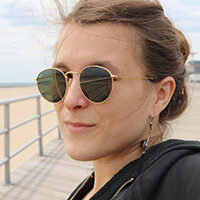
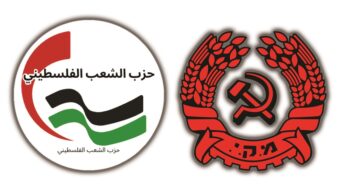
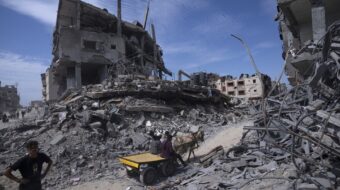
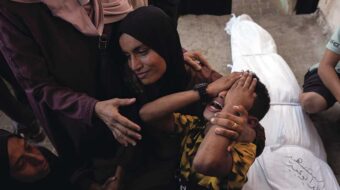






Comments